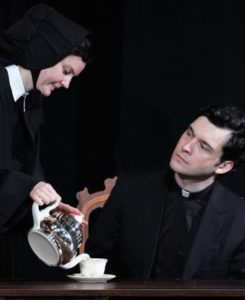Voltaire once said, “Doubt is not a comfortable position, but certainty is an absurd one.” Playwright John Patrick Shanley notes that “Certainty is a closed door.” His play Doubt is in one sense about sexual abuse in the Catholic church, but it is even more a meditation on the nature of doubt itself.
Doubt comes to us with an impressive pedigree: the 2005 Pulitzer Prize for Drama and a Tony Award for Best Play. Quotidian Theatre presents a carefully modulated performance, as melodic as it is emotionally powerful. The production runs for 90 minutes with no intermission. But those 90 minutes will fly by.

The play takes place in 1964 at St. Nicholas Catholic Church and School in the Bronx, NY during the Second Vatican Council (1962-5), popularly known as “Vatican II”. Latin services, after Vatican II, could be held in the vernacular, and the officiant in the Mass would now face the congregation instead of turning his back to them. The social upheavals of the 1960’s affected the Church too. Many nuns were involved in the civil rights and social justice movements. Women, as today, could not become priests, and they had no official role in Vatican II, although 23 women participated.
The Bronx neighborhood of the play is largely Irish and Italian, and the quality of life in the area is declining. The first African American child, Donald Muller, has been admitted to the 8th grade of the Catholic school, of which Sister Aloysius Beauvier (Stephanie Mumford) is the principal.
The conservative Sister Aloysius suspects the winning, socially liberal Father Brendan Flynn (Elliott Kastner) of an inappropriate relationship with Donald Muller. Her efforts take on the characteristics of a crusade, as she methodically pursues her quarry with the dedication of a novice and the tenacity of a trial lawyer. She also has a conflicted relationship with young Sister James (Chelsea Mayo).
Sister Aloysius’ belief in the value of iron discipline illuminates her every move. Sister James, on the other hand, is an enthusiastic teacher who loves history and wants her students to view her as a friend. Sister Aloysius views this as a weakness, and shakes Sister James’ confidence by referring to her as “not our best teacher.” Both actresses give vivid, exhilarating performances.
Kashner as Father Flynn charms us in the first scene, delivering in his modest yet appealing way a sermon about the topic of the evening, doubt. He is likeable and it is hard to believe that any suspicions could be valid, unless you have observed the intelligence and charisma displayed by many accused abusers. Many have said that the play is like a Rorschach test which everyone interprets with their own unique perspective. The play’s strength is that it is balanced on the knife edge of uncertainty. Kashner’s Father Flynn has a magnetism that helps us to see why children are drawn to him, and his anger at Sister Aloysius’ accusations is deeply felt. Whether such intense emotions indicate innocence or guilt Shanley does not explicitly say.
Kecia Campbell executes a stunning turn as Donald’s mother, Mrs. Muller, luminous with love for him at every moment, despite her mixed emotions. Director Stevie Zimmerman has brought out the very best in every actor. She has also integrated every element of the production into a compelling whole.
As the play begins, we hear the unearthly voices of a choir. The set (Set Design by Colin Dieck) is Sister Aloysius’ office, with a large desk, chairs, and a feeling of hard-won dignity appropriate to those long-ago days in the Irish and Italian Bronx. The garden scenes take place in front of the set, with two benches and the sound of birds in the background. A large cross, hung from the center of the stage, floats over the scene. Scenes are occasionally punctuated by the sound of bells.
The costumes are equally appropriate without taking too much focus (Costumes by Stephanie Mumford and Kecia Campbell). Lighting Design, by Don Slater, is excellent. And who could resist a production with a Bronx Dialogue Coach, Zachary Campion?
Laurie Goldstein, the national religion correspondent for The New York Times, has been covering sexual abuse in Catholicism and other religions since the ‘90s. In a Times Insider podcast (4/20/16), she says that the movie Spotlight has raised the issue once again. Whenever she writes a story, she receives calls and e-mails from survivors, and this happened with Spotlight as well. She affirms that things are better today. The Catholic church now must report allegations of sexual abuse; dioceses are checked up on every few years, and the number of reports has dropped significantly.
However, as recently as 2016, the citizens of the Altoona-Johnstown Diocese in Pennsylvania were shocked by a case which involved police and local government colluding with the church to cover up abuse.
Shanley’s language, as poetic as it is universal, has a unique lilt and directness that make it a pleasure to hear. The actors play together like a musical quartet, at ease with one another and overcoming the challenges of the material flawlessly.
Doubt is not to be missed.
Running Time: 90 minutes, with no intermission.
Doubt plays from through May 7, 2017 at Quotidian Theatre Company performing at The Writer’s Center – 4508 Walsh Street, in Bethesda, MD. For tickets, call the box office (301) 816-1023, or purchase them online.





